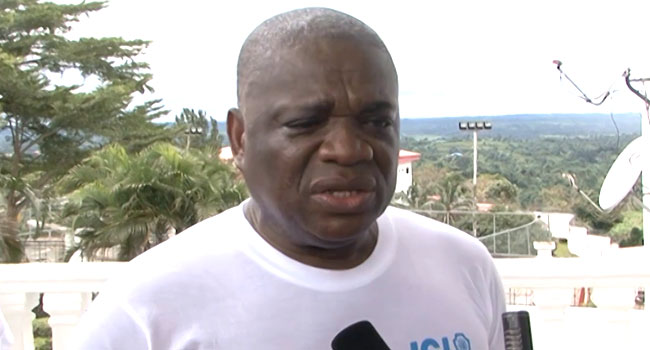By Onyewuchi Ojinnaka
Two Lagos-based lawyers, Femi Falana (SAN) and former Second Vice President of the Nigerian Bar Association (NBA), Monday Onyekachi Ubani, known for their outspokenness on contentious issues, especially human rights and legal issues, took different positions on the judgement of the Supreme Court which on Friday May 8, 2020 nullified the trial and conviction of former Abia State governor, Senator Orji Uzor Kalu, and his finance director Jones Udeogu.
The Apex Court quashed the conviction on the ground that Justice Mohammed Idris who tried and convicted Orji Kalu was as at that material time a judge of the Appeal Court and therefore had no jurisdiction to continue with the trial.
The apex court added that the fiat which empowered him to continue and conclude the case was unconstitutional and consequently ordered a retrial of Kalu at the lower court before another judge.
Falana, who faulted the judgement, lamented that the Nigerian legal system is only serving the interest of the ruling class in the country.
Falana argued that Section 396(7) of ACJA 2015 was introduced to stop rampant instances where criminal cases involving high profile personalities were stalled for a long period as a result of the elevation of the trial judge to a higher court.
He recalled how the trial of a former Managing Director of the defunct Intercontinental Bank, Erastus Akingbola, which had been fixed for final arguments, was made to start afresh, because the then trial judge, Justice Habeeb Abiru, was elevated to the Court of Appeal bench.
According to the critic and radical lawyer, “The same members of the ruling class have now got that Section of ACJA annulled.
“Head or tail, the members of the ruling class win, and it is the system that suffers.
“The Nigerian legal system has demonstrated its capacity to function effectively and serve the interests of the pampered members of the ruling class.
“A couple of months ago, ex-Emir Lamido Sanusi’s ex-parte application to secure his personal liberty from illegal banishment was assigned, heard and granted the day it was filed at the registry of the federal court.
“On that same day, the Certified True Copy of the court order was obtained, served and obeyed by the detaining authorities.”
Falana further noted that Kalu’s appeal against his conviction and sentence was pending at the Court of Appeal while the proceedings at the trial court were quashed on the basis of the appeal filed by his co-defendant, Jones Udeogu.
“Notwithstanding the order of the Supreme Court that the trial is commenced de novo (afresh), the case will not be concluded soon.
“Once again, the trial will have to go back to the Supreme Court!”, he posited.
But contrary to Falana’s position, Ubani lauded the Supreme Court for the judgement and agreed with the position that the trial judge acted unconstitutionally.
Ubani’s statement on the issue made available to TheNiche reads:
“The truth of the matter is that the trial court erred seriously in the handling of Orji’s matter which has led to the nullification of the conviction and sentence secured by the trial judge.
“Recall that one Justice Mohammed Idris who is now at the Court of Appeal was the trial judge at the Federal High Court Ikoyi of the criminal trial of Senator Orji Kalu.
“In the course of trial that lasted several years, about 12 years, he was subsequently elevated to the Court of Appeal. Orji’s trial appeared stalled until the President of of the Court of Appeal invoked a Section of the Administration of Criminal Justice Act, 2015 that empowered her to grant a fiat to the learned Judge to go back to the Federal High Court to conclude the trial which he dutifully did that led to Orji’s conviction and sentence.
“At the Supreme Court the noble learned Justices held that the judge who concluded the trial had no jurisdiction as the said fiat he was given to conclude the trial was inconsistent with the provision of the constitution that a judge of the Court of Appeal cannot “descend” to also be a judge of the Federal High Court.
“In other words, the composition of the trial court was at variance with the provision of the constitution that gives jurisdiction to the Federal High Court. The meticulous eyes of the judges of the Supreme Court saw the aberration and did not hesitate to so hold.
“What the judgment said is that the trial of Orji and others should start at the Federal High Court before a different and new judge assigned by the Chief Judge of that court de novo (from beginning).
“Please note that jurisdiction is a threshold issue and either a court has one or it does not have it and whenever the issue is raised even if for the first time at the Supreme Court and found to be lacking the Supreme Court will and has always nullified such trial.
“The judgement is sound and there is no basis to criticise it except on sentimental basis. It cannot be faulted legally. The people that drafted and inserted the section that permits a trial judge that has been elevated to continue with the trial at the trial court meant well, but they should have also persuaded the amendment of the constitution by the legislature on the issue of the jurisdiction of the trial court in the Circumstance.
“This omission is very grave and anyone defending that the amendment should have been allowed to stand even after offending the constitution is very strange argument.
“Jurisdiction is key to every case in Nigeria, nay in the world.
“The prosecution, EFCC, should assemble all its witnesses once again and be prepared to commence trial afresh after the Chief Judge has assigned the case to a new judge entirely. The judgement did not say that Orji is acquitted and discharged from the offence of the alleged fraud. He still has to face his trial anew.
“For Senator Orji Uzo Kalu, this is a temporary relief and if he succeeds in defending himself successfully over the allegation of fraudulent misappropriation of Abia’s treasury, it will be hossanna for him and his co-accused. We will as usual follow up this case until it is finally disposed of either way.”
Ubani, however, agreed with Falana that the retrial may still end at the Supreme Court if EFCC is serious with its threat.





